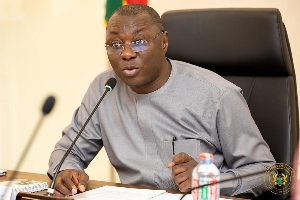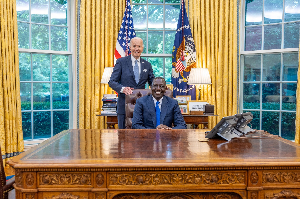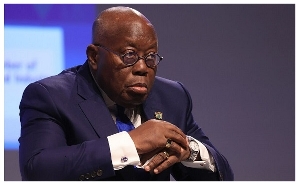- Home - News
- TWI News | TV
- Polls
- Year In Review
- News Archive
- Crime & Punishment
- Politics
- Regional
- Editorial
- Health
- Ghanaians Abroad
- Tabloid
- Africa
- Religion
- Election 2020
- Coronavirus
- News Videos | TV
- Photo Archives
- News Headlines
- Press Release
General News of Tuesday, 17 December 2002
Source: Palavar
IMF Warns Govt
Act Now Or Bankrupt Ghana’s Economy In a Staff Aide Memoire left behind for the government of Ghana after September 2002 visit of the IMF Review Mission, the Fund set out in no uncertain terms what the NPP government must do if the country is to avoid virtually being declared bankrupt.
The “no holds barred” Aide Memoire (AM) warned that if the fiscal and other policy developments in 2002 are left unchecked, the government’s entire economic strategy will be undermined. The AM also warned the government to stop the excessive government borrowing (currency printing) and the unbudgeted expenditure, and increase the prices of petroleum products to cover the cost of importation, refining and distribution, at worst.
The IMF warned that if its advice on these and other new policy issues are not taken by the government, the Fund will not be able to support any new programme for the country in 2003, the old programme already having been jettisoned for the NPP government’s non-performance.
Govt Failures
Among the non-performance issues the IMF Team uncovered was that total government expenditure during January-July 2002, was 9 per cent higher than budgeted. This was caused largely by- (i) Excessive salary and wage payments, especially in the education sector;
(ii) Higher-than-programmed subsidies to the public utilities due to the delay in increasing electricity and water charges and with respect to VRA, due to the failure to get parliamentary approval for the NDC- renegotiated VALCO Agreement or to renegotiate a new one of its own;
(iii) The addition of a further 800bn cedis to Tema Oil Refinery’s (TOR) debts in 2002 alone.
(iv) Delays in the ‘fast-track’ divestiture of specified state-owned enterprises;
(v) Shortfalls in foreign financing.
Those indicative targets assume that the government will do the following things:
- (i) Salaries and wages should be fixed at their September levels but should exclude new and all “extra duty” allowances;
(ii) Items 2 and 3 expenditure should be fixed at September 2002 levels;
(iii) Capital expenditure for the last quarter of 2002 should not exceed 460bn cedis. This will allow for full payments for interests and payments to the District Assemblies Common Fund, the Ghana Education Trust Fund, the Road Fund and other statutory funds, but will reduce the amount available for other development expenditure to half the budgeted amount, making a savings of 56bn cedis in all.
(iv) Cocoa Processing Company divestiture should yield 215bn ceids by the end of 2002 and sale of Ghana Consolidated Diamonds shares should yield 79bn cedis by the end of the year; (v) Counterpart funds for all donor-supported programmes except for the $4.8m HIPC bonus should not be disbursed, thus putting a virtual freeze on projects being executed with foreign funding; (vi) Apart from crude oil imports, Bank of Ghana should not release any foreign exchange on to the market;
(vii) Bank of Ghana should sterilise 50 per cent of the recent 400bn cedis liquidity injection into the economy; (viii) Increases in the prices of petroleum products to ensure cost recovery at worst; (ix) Government take-over of TOR’s current stock of short-term debts; (x) Salary/wage freeze for 2003.
A weak-kneed govt
It is pathetic to realise how the NPP government’s attempts to implement these measures have revealed it as a terribly weak-kneed government incapable of taking any difficult but necessary measures to rescue the country’s tottering economy. It has also not been able to admit to the country that it is taking these measures as a “take it or leave it” medicine from the IMF.Every implementation effort has been met with hiccups and the government has simply buckled under. First, in a bid to cut out extra duty allowances, the government tried a pilot implementation with the University of Cape Coast. A one-day strike by the campus UTAG (University Teachers Association of Ghana) over the issue saw the government buckling under and giving in to the lecturers by restoring the full 18 per cent allowances that they had attempted to remove.
Second was another attempt to scrap extra duty allowances in the Health sector. The result was disastrously pathetic. The junior doctors went on strike and the nurses and other paramedics threatened strike action. The government caved in within 48 hours.
Third, instead of mustering the necessary political will to increase the prices of petroleum products as demanded by the IMF, the government has been skirting the issue, giving reasons after reasons and through official after official, the latest being the “geek-like” Governor of the Bank of Ghana, trying to explain to an increasing sceptical country why they are not able to increase the prices.
Fourth, as for the VAT, until the IMF Aide Memoire put it down in black and white for the first time, the government had refused to admit that it had decided on an increase in the VAT rate, and when “Ghana Palaver” in its review of that budget revealed that the “Other Revenue Measures” budget line in that budget represented the VAT rate increase, this paper was nearly visited with fire and brimstone by government apologists.
Fifth, instead of the government taking over TOR’s debt as ordered by the IMF and raising revenue to absorb it, the President rather appealed to the European Union to “bail us out” of the TOR debt which has been accumulated from petroleum products that we ourselves have already consumed, as if somebody owes us a living.
Sixth, it is clear from the IMF demands why the government forced the SSNIT to purchase 280bn worth of the CPC shares, a transaction which the hapless transaction SSNIT on its own volition.
Clearly, the government’s “honeymoon period” with the Bretton Woods institutions is over. With the humbug “IFC” phantom $1bn loan also now over, observers await with the trepidation the kind of budget to be presented by Finance Minister, Yaw Osafo-Maafo.










